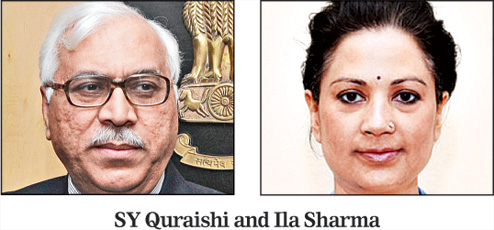
New Delhi, Oct. 5: The conference on money in politics was a "mix of disappointment (no solution) and consolation (not being alone)" for Shahabuddin Yaqub Quraishi in Mexico last September.
Professionally.
Personally, the occasion offered the former chief election commissioner of India an opportunity to build a bond that - provided everything goes well - may reach its logical conclusion sometime this week.
At the Mexico conference, Quraishi, 69, met Ila Sharma, 49. They had a lot to discuss, from democracy to electoral fair play to transparency in poll funding.
Naturally. Sharma is Nepal's election commissioner.
In the annals of boy-meets-girl fairytales, this was a memorable moment: a veteran election commissioner meeting another election commissioner and matters taking a life of their own since then.
"This is a personal bond between us," Quraishi told The Telegraph, reluctant to speak on the subject and the possibility of a wedding this week.
Quraishi sought to term the timing of the wedding "speculative", saying it had had to be deferred twice before for some reason or the other.
Sharma could not be contacted. "Please respect her sense of privacy," Quraishi said.
Sources said the prospective bride and groom were both facing mild resistance from their families.
Known for his easy manner and wit, Quraishi is a familiar face in Delhi's political and social circuits. A St. Stephen's alumnus and a 1971-batch IAS officer, he is divorced from Humra Quraishi, a journalist and columnist.
Sharma is no stranger to India, having earned a law degree from Gorakhpur University in 1987. She also holds a bachelor's degree in Sanskrit and Nepali literature from the Sampurnanand Sanskrit University in Varanasi.
Her husband Nawaraj Poudel, a police inspector, was killed by Maoists in western Nepal about 15 years ago. A former journalist with two daughters, Sharma has been deeply involved with advocacy groups working for economic, social and cultural rights.
On September 4, 2015, Quraishi had tweeted how the conference had left him with a mixed feeling. The meeting did not offer any solution to the problem of money in politics but the consolation was that India was not the sole country where misuse of money in politics was prevalent.
Evidently, the cause is close to the heart of Sharma, too. One of the reforms she has proposed as the election commissioner in Nepal is financial accountability and transparency in the election process. If her proposals get parliamentary approval, Nepalese parties that fail to submit annual audit reports may cease to be registered with the election commission.
As election commissioner, Sharma has drafted reforms bills that attach primacy to the periodicity of elections and aim to put Nepal's poll panel on a par with the government in deciding election dates.
Leaving election dates to the government is not desirable as they could become hostage to the will of the ruling party, she has suggested.
Sharma became the election commissioner for a six-year term shortly before the November 2013 polls amid boycott calls by hardline communist factions. The elections proved crucial in ending the political stasis in Nepal, paving the way for a more stable future.
Quraishi has a number of books, articles and lectures to his credit on issues relating to democracy, elections, HIV/AIDS and family planning, social marketing, women and child development and youth.
His book, Social Marketing for Social Change (1998), broke new ground in development communication. He is also the author of An Undocumented Wonder - the Making of the Great Indian Election (2014).
If everything goes well, perhaps Quraishi and Sharma would one day sit down together to chronicle another undocumented wonder: The Making of the Great Selection.










